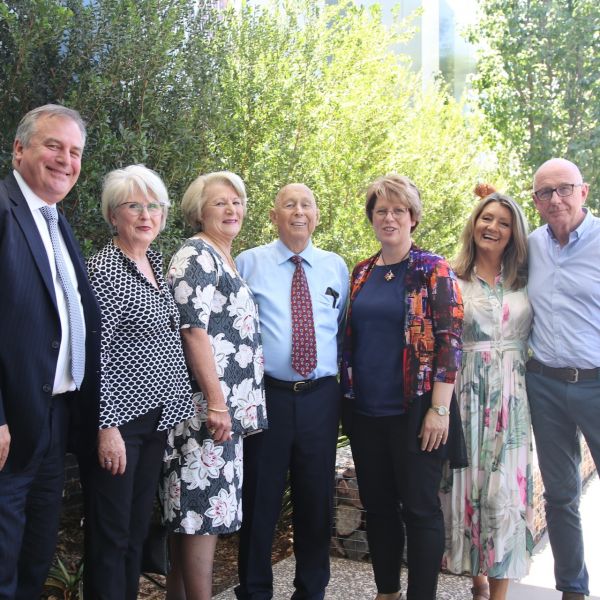Bequest to support education and training of rural healthcare professionals
Aspiring doctors and nurses from regional and remote areas will have greater opportunity to fulfil their career aspirations thanks to new scholarships being offered by the University of Newcastle.

The scholarships have been made possible by a generous bequest from beloved Tamworth resident and devoted nurse, Betty Josephine Fyffe.
The scholarships will see $10,000 funding available each year to 20 high achieving students from less advantaged backgrounds. The University will also establish the Betty Josephine Fyffe Chair in Rural Health to oversee quality rural training and research and advocate for improved health outcomes for rural Australians.
Rural shortages
The bequest and resulting scholarships aim to address the inequalities in health outcomes for Australians from remote and rural areas, as well as significant shortages in medical professionals in those areas.
University of Newcastle Vice-Chancellor, Professor Alex Zelinsky AO, said the scholarships will create greater equity for rural and remote healthcare.
“Every Australian, no matter where they live, should have access to world-leading healthcare,” Professor Zelinsky said.
“This incredible bequest will give students from regional and remote areas the educational platform to make a difference in the areas that need it most, and the University of Newcastle is incredibly grateful and privileged that we have been chosen to help carry out Betty’s wishes for more equitable health outcomes for Australians.”
Statistics from the Australian Medical Association reveal life expectancy in remote areas is up to seven years lower than those in major cities, with higher rates of heart and lung disease, suicide and cancer. Not only does this create greater pressures on the rural health workforce, there are fewer medical practitioners to treat them. The Australian Institute of Health and Welfare reports the number of doctors per 100,000 of the population in major cities is 437, while there were 272 in outer regional areas and only 264 in very remote areas.
Students who come from rural areas, but move away from home are up to three times more likely to return during their working life. These scholarships will provide students from both universities with education and hands-on training experience of the challenges and opportunities faced by health professionals on the front line of the rural health care system, in the hope they will return to regional areas to practice their profession.
Betty Fyffe
Elizabeth “Betty” Josephine Fyffe (née Cahill) grew up in Tamworth and its surroundings, where her father owned the Cahills chain of chemist shops. She had a passion for nursing, training at St Vincent’s Hospital before moving to Crown Street Hospital where she undertook her midwifery training. Betty also nursed at Prince of Wales Hospital for many years, returning as a volunteer after retirement.
With much of her life dedicated to caring for others, Betty left her legacy as a means to improve the education of doctors, nurses and allied health professionals in training in order to lead to better health outcomes in remote and rural areas.
She passed away on 6 January 2019, aged 92.
The scholarships
The University of Newcastle has established three scholarships in Betty’s honour: the Betty Josephine Fyffe Rural Allied Health Scholarship, Rural Equity Scholarship, and Rural Medical Excellence Scholarship.
Every year, 20 students will receive support across the three scholarships, with each receiving $10,000 in funding. The scholarships will be awarded next year to applicants who demonstrate academic achievement in the areas of nursing, midwifery, physiotherapy, nutrition and dietetics, occupational therapy, medical radiation science, pharmacy, and the Medical Science or Doctor of Medicine program. Recipients must also have recently lived in a regional or remote area and demonstrated community service.
The Betty Josephine Fyffe Rural Equity Scholarship will also specifically benefit disadvantaged students, including those with disabilities, Indigenous Australians and refugees, and individuals suffering financial hardship.
A further $150,000 per year will be allocated to fund the Chair in Rural Health, a key leadership position based in Tamworth at the University of Newcastle Department of Rural Health.
The bequest will also see scholarships offered at the University of New England. Both universities already work in partnership to deliver the world-class Joint Medical Program that helps to address the chronic health workforce shortage that exists in remote, rural and regional communities. The program, which is supported by the Central Coast Local Health District and Hunter New England Local Health District, celebrated its 10thanniversary last year and has already graduated more than 1,200 students.
Stephen J Mathews, from accountancy firm Malvern Mathews Smith, who manages the Elizabeth Cahill Fyffe Trust, paid tribute to Betty’s passion for improving healthcare.
“We are extremely pleased to be able to provide the University of Newcastle and the University of New England with funding to assist our future doctors and nurses while studying,” Mr Mathews said.
“The funding will also extend to contributing to the Rural Healthcare Solutions program to support the training and education of regional based healthcare professionals.
“We believe the foresight by Mrs Fyffe to implement this trust was driven by her passion for improvement in all areas of the medical treatment fields and also with a further motive of making it easier for the doctors and nurses to return to their rural origins.
“We encourage all potential healthcare persons to assess their entitlement and lodge an application with the universities.”
Find out more about the Betty Josephine Fyffe Rural Health Scholarships.
Related news
- Full circle in STEM: Lara’s journey from student to mentor
- From Delhi to Newcastle, full tuition scholarship makes STEM dreams come true
- World-leading MRI upgrade boosts research capability at HMRI Imaging Centre
- New equipment brings cancer's complexity into focus
- Yes, weight-loss drugs work but nutrition needs attention
The University of Newcastle acknowledges the traditional custodians of the lands within our footprint areas: Awabakal, Darkinjung, Biripai, Worimi, Wonnarua, and Eora Nations. We also pay respect to the wisdom of our Elders past and present.